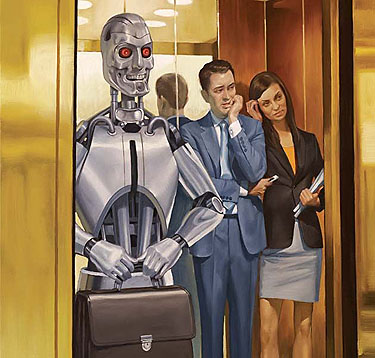Robots! That’s the topic of my latest piece in the current issue of the magazine. I’ve blogged on this subject a fair amount, but this is the first time I’ve tried to put everything together and explain what I really think robotics is likely to mean over the next few decades. Some of you are going to nod right along, some of you are going to think I’m crazy, and any economists in the audience are going to be rolling their eyes at my rather casual use of macroeconomic trend statistics to help make my point. But I’m pretty sure none of you will be bored.
So what is my point? First off, it’s the obvious one that I think computer hardware and software are progressing fast enough that we’re not very far away from true artificial intelligence. Along the way I break exciting new ground in describing Ray Kurzweil’s “back half of the chessboard” analogy, which illustrates how continuous growth can look insignificant for a long time and then suddenly explode. After immense amounts  of research, I decided on Lake Michigan as the key to my explanation of the chessboard analogy, but you’ll have to click the link to see what this means. It even comes with a nifty little graphic that our art department created to illustrate how Lake Michigan is just like a digital computer.
of research, I decided on Lake Michigan as the key to my explanation of the chessboard analogy, but you’ll have to click the link to see what this means. It even comes with a nifty little graphic that our art department created to illustrate how Lake Michigan is just like a digital computer.
Why spend so much time on all of this? Because whenever the subject of AI comes up, everyone wants examples but people like me can’t come up with any. That’s because AI doesn’t exist yet. So we haul out Watson and driverless cars and so forth, and it all seems like pretty weak tea. But Lake Michigan explains why it’s not. All these examples that seem pretty lame and not really very AI-like are exactly what you’d expect as mileposts along the road to AI. They aren’t demonstrations of how far away we are, but exactly the opposite. They’re demonstrations of how close we are. When this all finally happens, it’s going to happen fast.
That’s the first half of the piece. The second half is about what all this means. If AI is coming—and coming quickly—what does it mean for the economy? In the long run, it will be great, an era of both infinite leisure and material progress. But in the medium run I think the consequences will be fairly grim: more and more people will be put out of work, and no, there won’t be new jobs that open up for them along the way. This will very decidedly not be a replay of the Industrial Revolution. What’s worse, it will all happen so slowly that we’re going to spend a long time denying what’s unfolding before our eyes, and a whole lot of people are going to suffer because of it.
In fact, I think automation has been affecting our economy in nontraditional ways since about 2000 or so. Only by a tiny amount, though, which means it’s impossible to demonstrate its impact conclusively. Still, you can amass evidence, and that’s what I do. There may be other explanations for each of the trends I talk about, but when you put them all together I think the simplest collective explanation is that they point in the direction of automation already having a slight effect on employment and capital intensity. Slight but growing. Two or three decades from now, the Warren Buffetts of the world will own all the robots and a big chunk of the world will be permanently unemployed.
Do I prove this? Not by a mile. But in the end, I meant for this piece to be read as provocation more than anything else. So go ahead and be provoked, one way or the other. Click the link.

















